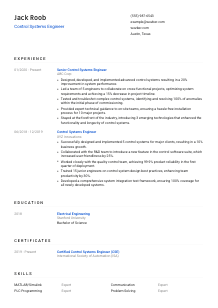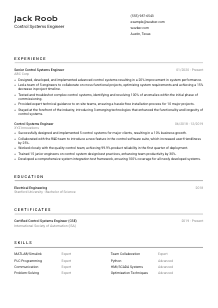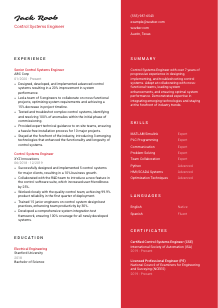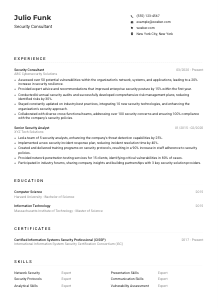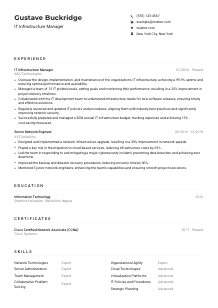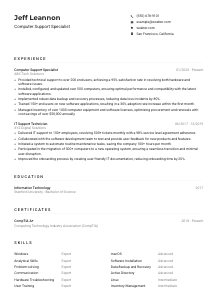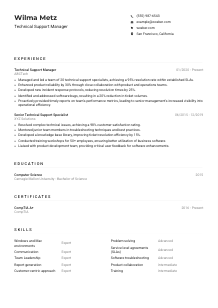Control Systems Engineer CV Example
Scripting dynamic automation, but your CV seems stuck in manual mode? Navigate through this Control Systems Engineer CV example, fine-tuned with Wozber free CV builder. Grasp how you can calibrate your control prowess to sync seamlessly with job needs, propelling your career on an optimized trajectory!
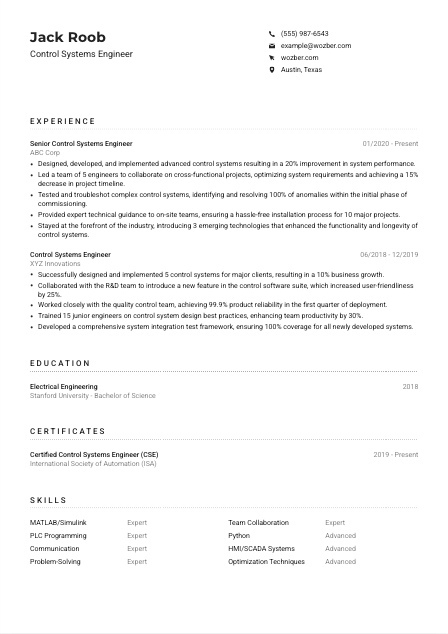
How to write a Control Systems Engineer CV?
Embarking on the journey to land your dream Control Systems Engineer position? You're crafting more than a CV; you're engineering a document that highlights your precision, efficiency, and prowess in turning complex systems into seamless operations. Using Wozber's free CV builder, this guide will show you how to fine-tune your CV into an ATS-compliant showcase of your skills and experiences that speaks directly to what hiring managers are looking for. Let the optimisation begin!
Personal Details
The personal details section is where you lay the groundwork, presenting yourself as the candidate they've been searching for. Let's ensure your Control Systems Engineer application starts on the right note.
1. Highlight Your Name Professionally
Your name isn't just a label, it's the headline of your professional story. Choose a clear, professional font that sets the stage for the detailed script of your achievements that follows.
2. Align with the Job Title
Immediately catch the hiring manager's eye by listing 'Control Systems Engineer' directly under your name, mirroring the job you're applying for. This simple alignment makes your CV feel custom-crafted for the role.
3. Essential Contact Details
Ensure your contact information is error-free. Include a phone number and a professional email; consider firstname.lastname@email.com format to keep it classy. Double-check these details to avoid any communication mishaps.
4. Location Matters
"Must be located in Austin, Texas." If you meet this requirement, make sure it's visible in your contact details. It's a key checkbox for the employer that you're perfectly situated for the role.
5. Online Presence
In today's digital world, showcasing a LinkedIn profile or a professional website can offer a more comprehensive view of your professional landscape. Ensure these are current and mirror the achievements and skills listed on your CV.
Takeaway
Think of your personal details as the launching pad for your application. It's the first impression you make, so ensure it's polished, professional, and precise, setting you apart as a serious Control Systems Engineer candidate. Keep it streamlined and targeted, just like your approach to system optimisation.





Experience
The experience section is where you shine a spotlight on your professional narrative, highlighting how your journey aligns perfectly with the role of a Control Systems Engineer. Let's engineer this section to showcase your mastery.
- Designed, developed, and implemented advanced control systems resulting in a 20% improvement in system performance.
- Led a team of 5 engineers to collaborate on cross‑functional projects, otimizing system requirements and achieving a 15% decrease in project timeline.
- Tested and troubleshot complex control systems, identifying and resolving 100% of anomalies within the initial phase of commissioning.
- Provided expert technical guidance to on‑site teams, ensuring a hassle‑free installation process for 10 major projects.
- Stayed at the forefront of the industry, introducing 3 emerging technologies that enhanced the functionality and longevity of control systems.
- Successfully designed and implemented 5 control systems for major clients, resulting in a 10% business growth.
- Collaborated with the R&D team to introduce a new feature in the control software suite, which increased user‑friendliness by 25%.
- Worked closely with the quality control team, achieving 99.9% product reliability in the first quarter of deployment.
- Trained 15 junior engineers on control system design best practices, enhancing team productivity by 30%.
- Developed a comprehensive system integration test framework, ensuring 100% coverage for all newly developed systems.
1. Decode the Job Requirements
In your Control Systems Engineer role, dissect the job description to understand the accomplishments and experiences that most align. This means diving deep into details like system design improvements and cross-functional collaborations which mirror the job's demands.
2. Format with Precision
Structure your experience in reverse chronological order, ensuring your most recent and relevant roles take precedence. This format showcases your evolving expertise in the control systems engineering sphere.
3. Tailor Your Achievements
Craft bullet points that resonate with the job description. For example, detail how you "Designed, developed, and implemented advanced control systems resulting in a 20% improvement in system performance" to demonstrate direct impact and relevance.
4. Quantify Your Impact
Whenever possible, anchor your achievements with numbers. This could be the percentage improvement in system performance or the number of projects led. Quantifiable results provide a clear metric of your success.
5. Relevance Is Key
Keep the focus sharp. Only include experience that underscores your suitability for the Control Systems Engineer position. Irrelevant roles can distract from your key message of being the ideal candidate for the job.
Takeaway
Your experience section is a testament to your journey, highlighting the precise, calculated, and successful paths you've taken in the world of control systems engineering. Each bullet point is an opportunity to illustrate your suitability and readiness for this new challenge. Showcase your achievements with pride and a keen eye for relevance and impact.
Education
The education section of your CV is more than just a list of degrees; it's the bedrock of your Control Systems Engineer qualifications. Let's sculpt this section to highlight your specialized background.
1. Highlight Required Degrees
Aligning with "Bachelor's degree in Electrical, Mechanical, or Industrial Engineering, or a related field", ensure your highest relevant degree is front and center. This direct match reassures the hiring manager of your foundational knowledge.
2. Keep It Sleek and Simple
Stick to the essentials: degree title, institution, and graduation year. For instance, 'Bachelor of Science in Electrical Engineering, Stanford University, 2018' tells the employer everything they need to know at a glance.
3. Degree Specifics
If your degree precisely aligns with one of the preferred fields mentioned in the job description, make it the highlight of this section. This instant connection builds a bridge between your qualifications and the job requirements.
4. Relevant Extras
Should you have completed courses or projects specifically relevant to control systems engineering, such as PLC programming or MATLAB, including these can add depth to your educational background.
5. Celebrate Academic Achievements
If you have accolades like honors or awards that showcase your dedication and excellence in your field, don't hesitate to include these. They add another layer of credibility to your educational qualifications.
Takeaway
By meticulously aligning your education section with the job requirements, you present yourself as a candidate with not only the requisite knowledge base but also a testament to your dedication to the field. Let your educational qualifications serve as the solid foundation upon which your professional achievements are built.
Certificates
In the fast-evolving field of control systems engineering, certifications can play a crucial role in setting you apart. They are badges of your commitment to staying ahead in your domain. Let's pinpoint how to present these effectively.
1. Understand Certifications' Value
Even if the job description doesn't explicitly call for certifications, showcasing relevant ones like 'Certified Control Systems Engineer (CSE)' directly correlates with your proficiency and ongoing dedication to professional development.
2. Highlight the Most Relevant
Choose certifications that closely align with the technical and practical aspects of the Control Systems Engineer role, prioritizing those that demonstrate your competency in critical areas mentioned in the job description.
3. Date and Detail
For each certification, provide a concise detail including the issuing body and the date of achievement. This offers insight into your current competencies and shows an ongoing commitment to your professional growth.
4. Embrace Continuous Learning
The field is always advancing, and so should you. Regularly seek out new certifications and learning opportunities that not only fuel your passion but also fortify your CV, keeping you at the leading edge of control systems engineering.
Takeaway
Think of each certification as a badge of honor, showcasing your dedication and expertise. By strategically selecting and presenting your certifications, you're telling the story of a professional who is committed to excellence and continuous improvement in the control systems engineering landscape.
Skills
The skills section of your CV is your professional arsenal; it showcases the tools and technologies you master. In the realm of control systems engineering, specific technical and soft skills can significantly impact your candidacy.
1. Skill Selection
Dive into the job description to extract both the explicit skills required and those implicitly suggested. Listing skills like 'MATLAB/Simulink', 'PLC Programming', and 'Problem-Solving' directly reflects the job's technical demands and your proficient toolbox.
2. Align and Prioritize
Prioritize your skills based on their relevance to the role. For a Control Systems Engineer, technical skills in software and programming should be at the forefront, complemented by essential soft skills such as 'Communication' and 'Team Collaboration'.
3. Layout and Legibility
Opt for a clear, consistent format, making it easy for hiring managers to pinpoint your strengths at a glance. This not only demonstrates your organisation skills but also ensures your most potent abilities don't get lost in a sea of text.
Takeaway
Your skills section is a concise display of your capability and readiness for the challenges of a Control Systems Engineer role. By carefully selecting and presenting your skills, you're painting a picture of a well-tooled professional, prepared to make a significant impact in any project or team.
Languages
In a global and diverse working environment, language skills can set you apart, opening new channels for communication and collaboration. For a Control Systems Engineer, this could mean the difference in working smoothly with international teams or clients.
1. Language Relevance
Start by identifying any language preferences or requirements from the job description. While our example doesn't explicitly demand additional languages, being fluent in languages like Spanish, in addition to 'English: Native', showcases a valuable breadth in communication.
2. Prominence to Primary Language
Ensure your proficiency in English is prominently displayed, given its specified requirement for high-level proficiency in the job description. This immediately reassures the employer of your ability to communicate effectively.
3. Additional Languages
List any additional languages you speak, indicating your level of fluency. Even if not specifically required, additional languages speak to your adaptability and global perspective.
4. Honesty in Proficiency
Be realistic about your language proficiencies, using terms like 'native', 'fluent', 'intermediate', or 'basic'. This gives an honest portrayal of your communication capabilities across different contexts.
5. Scope for Global Engagement
For roles that might entail international collaboration or support, being multilingual could be a significant advantage. It demonstrates your preparedness for a broader scope of engagement, making you a more versatile asset.
Takeaway
Your linguistic abilities are a testament to your capacity for clear communication and cultural adaptability. By showcasing your language skills, you're signaling to potential employers that you're not just technically proficient but also ready to engage and collaborate in a global setting. These are invaluable traits in the interconnected world of control systems engineering.
Summary
The summary section is your elevator pitch, where you encapsulate your value proposition as a Control Systems Engineer. It's about drawing the recruiter into your narrative, making them eager to dive deeper into your CV.
1. Grasp the Job's Core
Start by understanding the heart of the Control Systems Engineer role. This isn't just about technical skills but also involves collaboration, problem-solving, and innovation.
2. Start with a Strong Opening
Begin your summary with a compelling statement that highlights your profession and years of experience, positioning you as an insightful expert in the field. For instance, "Control Systems Engineer with over 7 years of progressive experience..." sets a solid, experienced tone.
3. Mirror Key Requirements
Incorporate a mix of technical and soft skills that resonate with the job description, demonstrating your direct alignment with the role's needs. Highlighting achievements such as "designed, developed, and implemented control systems resulting in improved performance" directly ties your experience to the employer's objectives.
4. Keep It Snappy
Conciseness is key. In three to five lines, pack in your expertise, key achievements, and what you bring to the table. This teaser should leave the hiring manager curious and eager to learn more about you.
Takeaway
Your summary is the narrative arc of your professional story. It sets the stage for everything that follows, hinting at the depth of your experience and the breadth of your capabilities. Craft this section with the precision and care you would apply to a complex control system, ensuring it showcases your role as a key player in the engineering field. Let it be intriguing, succinct, and reflective of your professional identity.
Charting Your Course
Congratulations! You now have the blueprint to construct an ATS-compliant CV that not only matches the job description for a Control Systems Engineer but showcases your unique skills and experiences. Use Wozber's free CV builder, equipped with ATS-friendly CV templates and the ATS CV scanner, to ensure your CV is perfectly tailored and optimised. Now, go ahead and engineer your path to success. Your next opportunity awaits, and the world is ready to see what you can do.

- Bachelor's degree in Electrical, Mechanical, or Industrial Engineering, or a related field.
- Minimum of 5 years of experience in control system design, implementation, and troubleshooting.
- Proficient in using control system software such as MATLAB/Simulink, Python, or similar tools.
- Strong understanding of industry standards and protocols, including PLC programming and HMI/SCADA systems.
- Excellent problem-solving, communication, and interpersonal skills.
- Must have a high level of English proficiency.
- Must be located in Austin, Texas.
- Design, develop, and implement control systems for various applications ensuring optimal performance and functionality.
- Collaborate with cross-functional teams to gather system requirements, conduct simulations, and oversee control system integration.
- Test and troubleshoot control systems to identify and resolve any anomalies or inefficiencies.
- Provide technical guidance and support to on-site teams during installation and commissioning phases.
- Stay updated with industry trends, best practices, and emerging technologies to ensure continuous improvement of control systems.





